
Arquivo para a ‘Linguagens’ Categoria
Smooth the paths
All of reality seems like a huge mess, and in fact it is without a meditative perspective (the vita contemplativa that we posted last week) and without a prophetic vision that goes beyond factual reality, which is almost always dualistic because it only sees through one aspect. guys.
is without a meditative perspective (the vita contemplativa that we posted last week) and without a prophetic vision that goes beyond factual reality, which is almost always dualistic because it only sees through one aspect. guys.
There will be wars, revolutions, people against people, everything that overwhelms false prophets, soothsayers and bad biblical readers, announcers of themselves and not of divine reality.
Yes, the biblical reading is this Mt 24,7-8: “For nation will rise against nation, and kingdom against kingdom, and there will be famines and earthquakes in various places; but all this is the beginning of sorrows” yes, but this “will not be the end” and the reading does not stop there: “many false prophets will arise and deceive many”.
Although we are experiencing a great civilizational crisis, the Bible speaks of the “great tribulation”, all of this is in reality a “straightening of the paths”, as John the Baptist did at the time of the coming of Jesus.
They asked him if he was the Messiah or Elijah (John 1:22-24): “They then asked: ‘Who are you after all?’ We have an answer for those who sent us. What do you say about yourself?’ Then John declared: “I am the voice that cries in the wilderness, ‘Make the way of the Lord plain’” as said the prophet Isaiah”, who prophesied that God would send light and joy through a child , and who would break the “yoke of his burden” (Isaiah 9:4) and would be called “Wonderful, Counselor, Mighty God, Everlasting Father, Prince of Peace” (verse 6).
It is indeed a civilizational crisis, models of society in shock, dangers of wars in limits and proportions never imagined, but all of this is also “smoothing the paths of the Lord”, the coming of a New Civilization, not that of false prophecies, but the kingdom of peace.
Beware of false prophets, with promises of paradise that do not come true, they also feed on crises, cruelty and wars, but do not propose peace and justice, or they don’t build them.
The last prophet and his culture
John the Baptist was the son of Elizabeth, married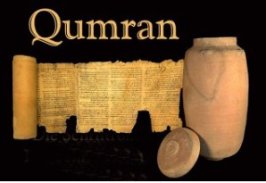 to Zechariah and cousin of Mary, who upon receiving the sign from an angel that she would conceive goes to visit her, the biblical narrative hurriedly says, but also because the angel tells her that she is full of doubts: “her cousin, who was barren, conceived in old age” (Luke 1:36-40), a passage full of interpretations, but that’s for later.
to Zechariah and cousin of Mary, who upon receiving the sign from an angel that she would conceive goes to visit her, the biblical narrative hurriedly says, but also because the angel tells her that she is full of doubts: “her cousin, who was barren, conceived in old age” (Luke 1:36-40), a passage full of interpretations, but that’s for later.
Who John the Baptist was was better clarified in the Dead Sea Scrolls (see reference) found in the Dead Sea, very recently, but which biblical readers and exegetes completely ignore.
Many controversies arose from the Qumran manuscript, including that Jesus was actually an Essene, another that some fled to India and founded communities there with their principles, some of these manuscripts were inside clay jars and spoke about the life of Jesus Christ and talked about the importance of cures with alternative medicine and the importance of vegetarian culture.
The Essenes also defended unity and peace, as it was a period of division among the Jews, several had contact with Jesus and are present in biblical passages, and thus already had a different cult than the Sadducees and Pharisees.
The Sadducees were people from high society, members of priestly families, educated, rich and aristocrats; The Pharisees did not believe in life after death and therefore said nothing about their eschatological vision (of the beginning and end), becoming more concerned with Jewish rules and “laws”.
The zealots, others who joined Jesus, rejected paying tribute to the Roman empire, on the grounds that such an act was a betrayal against God, among Jesus’ apostles, Simon was a zealot and Judas, the traitor too, and also the late apostle Paul of Tarsus refers to himself as a religious zealot (Acts 22:3; Gal 1:14).
This gives a more cultural and political context about Jesus and his apostles, it does not take anything away from their divinity, but it explains the controversies and contradictions with the more orthodox Jewish culture of the time.
Regarding this controversy, the Jewish academic Dr. Israel Knohl, president of the Biblical department at the Hebrew University of Jerusalem, and guest at the universities of Berkeley and Stanford, presents in his book: “The Messiah Before Jesus”, writes based on these parchments, the thesis that around the year of Jesus’ birth, a supposed messiah Menahem, the Essene, had died in circumstances similar to those of Jesus and this was known to Jesus.
Controversies aside, it does not weaken the biblical narratives of Jesus and John the Baptist, but it clarifies cultural and historical aspects better.
«The Weirdo Cult That Saved the Bible» (in english). Slate. Consulting in July of 2015.
Prophecies about the coming of Jesus
There were many prophecies about the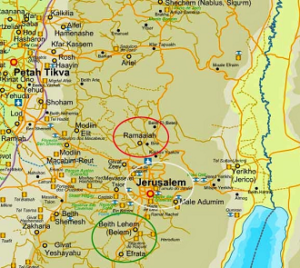 coming of the messiah, although Isaiah’s is the most cited (Isaiah 7:14): “therefore the Lord himself will give you a sign: Behold, the virgin will conceive, and will give birth to a son, and will call him his name Emmanuel.”
coming of the messiah, although Isaiah’s is the most cited (Isaiah 7:14): “therefore the Lord himself will give you a sign: Behold, the virgin will conceive, and will give birth to a son, and will call him his name Emmanuel.”
What does God mean with us, so is the first argument that Jesus was God”, but Zechariah’s eight visions are interesting for two reasons: that he spoke most about messianic prophecies and that his name is that of the father, the last and greatest of the prophets John the Baptist, Zechariah means “remembered by God”.
Thus the prophet Zechariah, who is not Elizabeth’s husband, among his various prophecies, predicted the coming of the Messiah to Jerusalem and the rejection by His people (Zechariah 9,11).
Bethlehem was a small village, the birthplace of King David, and the prophet Micah (5:2) who predicted the hometown of Jesus, was said to be from Bethlehem of Ephrath, from the clan of Judah (one of the 12 tribes of Israel born from the children of Israel, Jacob’s new name), said Micah: “But you, Bethlehem Ephrathah, though you are small among the clans of Judah, from you will come to me one who will be ruler over Israel. Its origins lie in the distant past, in ancient times.”
Yes, because a prophecy in the first biblical book, which states that from the Jewish people (Hebrews at the time of Abraham), nine people will be born, is in Genesis (12:2-3):
“I will make you a great people, and I will bless you. I will make your name famous, and you will be a blessing. I will bless those who bless him, and I will curse those who curse him; and through you all the peoples of the earth will be blessed”, see that the prophecy goes beyond the Abrahamic peoples, although there are Jews and Christians who do so.
And finally the prophet made to David in Psalm 89:3-4: “I made a covenant with my chosen one, I swore to my servant David: “I will establish your lineage forever and I will establish your throne for all generations”.
Joseph, Mary’s husband, went to Bethlehem (prophesied by Micah) because he was from David’s lineage and his son should be registered there, so it is also a historical fact, as there was a sense when Jesus was born.
Someone who knows the Bible may ask and John the Baptist, yes he baptized Jesus and did not prophesy but announced (or if you prefer the greatest prophesy), after me will come one “who am not worthy even to untie his sandals” (John 1:27), well whoever untied his sandals slaves were to wash the feet and John the Baptist did not even consider himself worthy of this.
There are so many prophecies, and the fit is so divine and logical (the sense that Jesus told, for example), that the sign of his birth is divinely and humanly clear.
Narratives, Palestine and Israel
Primary orality, a period before printed writing, was the way of transmitting stories and the culture and tradition of people through narration. We live in modern printed culture and now a culture called “post-narrative” by Byung Chul Han emerges.
Says Han: “Today everyone talks about narrative. The paradox is that the inflationary use of narratives reveals a crisis of narration itself”, he says at the beginning of his book “The Crisis of Narration”, establishing an opposition between narratives and narration.
Prophets and oracles were responsible for narratives in the period before writing. It is worth remembering that scribes and clay tablets were present in archaic cultures, however, it was the narrative that sustained traditions in oral cultures, including original ones.
A modern interpretation, made by Walter Ong, disciple of Marshal McLuhan, is that myths were used as a mneumotechnical process, that is, “hooks” so that the narrative did not deviate from the initial narrative, maintaining cultures and traditions, thus great works of Western culture such as Iliad and Odyssey can be reread in this aspect.
The prophets do not differentiate themselves from these cultic aspects, they have the pretension or in fact they can be divine revelations, since numerous facts in these narratives reveal divine intervention, the departure of Abram (only later to be called Canaan) from the region of Chaldea, giving rise to the Hebrew people, which meant on the other side of the river, until the arrival of the region where his son Isaac will be born, but he will also have a son with the slave Hagar, called Ishmael, and only later will he have a son with Sarah, Isaac who will have two sons Esau and Jacob (later called Israel, he who wrestled with God).
Already in the mother’s womb the two were fighting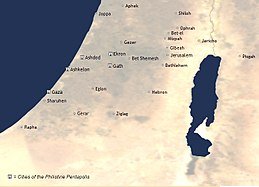 and the biblical narrative says, Genesis 25:23: “And the LORD said to her: Two nations are in your womb, and two peoples will be divided from your womb: one people will be stronger than the other. other people, and the greatest will serve the least”.
and the biblical narrative says, Genesis 25:23: “And the LORD said to her: Two nations are in your womb, and two peoples will be divided from your womb: one people will be stronger than the other. other people, and the greatest will serve the least”.
From conception, the biblical narrative reveals two people in struggle, Rebekah was sterile and when she gave birth to the twins, Esau was born first for a few minutes and was supposed to inherit the tribes, but Jacob, using a trick of pretending to be his brother who was hairy, went to his father who is almost blind and asks him to bless him, which he does, but later realizing that he would have to fight with his brother, says the narrative, in a region called Jabbok ford (a tributary of the Jordan) he fights with an angel for God to bless him, and from then on he is called Israel, meaning one who fights with God.
However, the Ishmaelites will continue to exist and are not to be confused with the Palestinians, who come from the ancient people called Philistines, initially they were on the southwest coast of Canaan, forming Philistia, despite having adopted the local Canaanite culture, studies point to an Indo-European origin for countless words and even in the first wars they already knew how to make steel, while the Israelites still mastered bronze (in the photo the map from 830 BC).
«Origem dos filisteus pode ser finalmente revelada por DNA antigo». National Geographic. 15 de julho de 2019 (in portuguese).
Blessed Duns Scotus
The wisdom and depth of the teachings of this 13th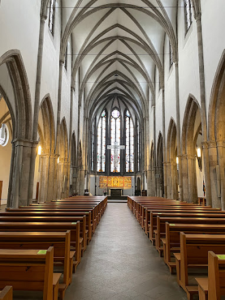 century Franciscan friar, however, took 9 centuries to be recognized and venerated by the Catholic Church. It was only during the Pontificate of John Paul II that he was beatified and recognized as a saint.
century Franciscan friar, however, took 9 centuries to be recognized and venerated by the Catholic Church. It was only during the Pontificate of John Paul II that he was beatified and recognized as a saint.
Pope Francis in a recent homily extolled the qualities of Scotus, stating: “There are great scholars, great specialists, great theologians, teachers of the faith, who have taught us many things. They penetrated the details of Sacred Scripture (…), but they could not see the mystery itself, the true core (…). The essentials remained hidden! (…)”.
Gifted with a brilliant intelligence and driven to speculation, this intelligence for which he earned the title of Doctor subtilis “Subtle Doctor”, Duns Scotus was directed to study philosophy and theology at the famous universities of Oxford and Paris and his work
Endowed with a brilliant intelligence and driven to speculation – this intelligence for which he earned the title of Doctor subtilis, “subtle Doctor” from tradition -, Duns Scotus was directed to the studies of philosophy and theology at the famous universities of Oxford, Cambridge and Paris , and thus his works received the titles of Opus Oxoniense (Oxford), Reportatio Cambrigensis (Cambridge), Reportata Parisiensia (Paris).
Among his mystical works are studies on the incarnation, in Reportata Parisiense he wrote: “To think that God would have renounced this work if Adam had not sinned would be totally irrational. I say, therefore, that the fall was not the cause of Christ’s predestination, and that, even if no one had fallen, neither angel nor man, in this hypothesis Christ would still have been predestined in the same way” (in III Sent, d 7.4).
Duns Scotus, still aware that, in reality, because of original sin, Christ redeemed us with his Passion, Death and Resurrection, reaffirms that the Incarnation is the greatest and most beautiful work in the entire history of salvation and that this is not conditioned by no contingent fact, but is God’s original idea of finally uniting all created things with Himself in the person and flesh of the Son.
Pope Paul VI also declared this vision of the incarnation affirmed in Scotus: “strongly “Christocentric”, it opens us to contemplation, stupor and gratitude: Christ is the center of history and the cosmos, he is the One who gives meaning, dignity and value to our lives.” (homily of November 19, 1970).
Not only the role of Christ in the history of salvation, but also that of Mary is the object of reflection in Doctor subtilis. At the time of Duns Scotus, most theologians opposed an objection, which seemed insurmountable, to the doctrine according to which Mary Most Holy was exempt from original sin from the first moment of her conception: the dogma of the Immaculate conception of Mary, defended by Scotus centuries before the Catholic Church declared it.
Scotus was so convinced of this dogma that he was buried in the church of the Immaculate Conception of the Virgin Mary (photo), in Cologne, Germany, where he died on November 8, 1308.
Duns Scotto and moderate realism
Duns Scotus is the most typical thought of moderate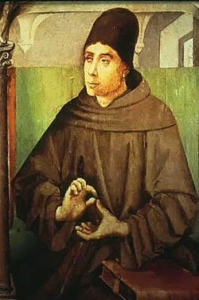 realism, as it linked the question of language as part of the essence of being (as the question is presented today) to the existence of universals, but he knew that he also admitted nominalism in part.
realism, as it linked the question of language as part of the essence of being (as the question is presented today) to the existence of universals, but he knew that he also admitted nominalism in part.
He was a philosopher and theologian from the 13th century, his main theological thesis is that God exists through the question: “whether there is among beings an infinite being currently existing” (Ordinatio I, part 1, qq. 1-2) and for him universals how “truth” and “goodness” really exist.
Duns Scotus supported a universal foundation in things (some philosophers will call it quiddity) that was stronger than those supported by Thomas Aquinas, and the entity proper to common nature that serves as the basis for individuation (so there are horses and there is the “ horse” particular to a breed, color, etc.) as well as to the universality that it adds, leaving it as if untouched (the specific horse remains a universal “horse”).
The argument that separates the “contemplative” from the “active” is in this origin of thought, the idea that the Universal is outside the intellect with the same way of being that is in the intellect and was what the scholastics called “naive realists”, returning to Plato, there are two worlds: the sensible world and the world of ideas (eidos, different of modern concept).
Even though eidos may be different from post-Kantian idealism, there remains within this thought a conception of the world “of ideas” different from the real world, that is, a radical nominalism whose Aristotelian categories were transformed into “concepts”.
Plato’s fundamental idea, and don’t be alarmed, is at the basis of modern thought, is that the truth is out there and not inside man, where he sees it through a process of meditation or contemplation, as Arendt (and others) have already argued. interpreters of philosophy) see the cave myth differently, argued Byung-Chul.
It is not this type of “parreheia” (opening of the Truth) that Duns Scotus speaks of, and Augustine of Hippo also spoke of, but rather that truth that dwells within every man.
It is in the fifth argument that Scotus uses Augustine: “If we both see that what you say is true, and if we both see that what I say is true, where, I ask, do we see it? Neither I, without a doubt, see it in you, nor you in me, but we both see it in the immutable Truth that is above our intelligence.”
Something similar is said by Socrates: “the truth is not with men, but among men”.
Scotus, John Duns. (1973) Text Selection. In: Os Pensadores (Braziliam Collection). São Paulo: Abril Cultural.
Moderate realism and contemplation
It has already been stated that the rupture of the 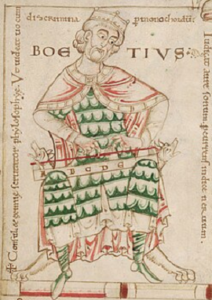 vita contemplativa was due to homo laborans, that is, in modernity when work becomes an economic imperative, especially for the poorest layers of society, at the beginning of the industrial revolution there was not even a time limit for workers and many industries disrespected even Saturday and Sunday.
vita contemplativa was due to homo laborans, that is, in modernity when work becomes an economic imperative, especially for the poorest layers of society, at the beginning of the industrial revolution there was not even a time limit for workers and many industries disrespected even Saturday and Sunday.
However, the issue arose in the Middle Ages, organized work in monasteries, and many of the first Benedictine monks came from the nobility, was carried out for the first time by free men, and even the word “tripalium” from which work comes meant torture (gutting). .
While thought in this medieval period arises the quarrel of universals, there are several versions for its origin, but a widely accepted one is a fragment found in the writings of Boethius (480-525 AD), before Thomas Aquinas, he translated into Latin and commented Aristotle, albeit partially, and made an introduction to Aristotle’s “Categories”.
The dispute was about questioning whether these categories were real things that existed or just names that were given to things, hence the medieval realist and nominalist currents, which have reached our days with the issue of the linguistic shift recently revived.
The fact that these things exist or not means that we must see Being as a being of language, as argued by Heidegger, or simply a fruit of the material environment and its variations, it is not just current materialism derived from objectivism, but from a view of the subjective, after all that which is characteristic of being (subjective comes from subject).
Moderate realism in the Middle Ages approached, but placed limits on realism, for example from Thomas Aquinas, who, as Boethius will reread the work of Aristotle, in his Summa Theologiae, characterizes as reason and this is a forgotten root of modern rationalism .
Boethius, much earlier in his reading of Aristotle, makes the choice between a “transcendent” or extreme realism, more of a Platonic nature, and an “immanentist” or moderate realism, influenced by Aristotle. It is important to emphasize that Boethius was a reader of Porphyry with a strong influence.
The question left by Boethius was “whether” universals (categories) existed, just to exemplify the idea of animals that are generic horses or real horses with race, color and their species, and which can be understood in two comments:
“since that it is necessary, Chrysarius, to know, through the useful contemplation of these things, what is genus and what is difference, what is species and what is proper and what is accident, as much as in Aristotle … Next, I will certainly refuse to say, about genera and species, the following: do they subsist or are they placed in isolated and naked intellects? Subsistent, are they corporeal or incorporeal?” (Boethius, 1906, p. 147).
The issue deserves to be deepened since the “names” of things mean a language.
Boécio. (1906) In Isagogen Porphyrii Commenta. Corpus Scriptorum Ecclesiasticorum Latinorum, vol. 48. Vindo-bonae: F. Tempsky/ Lipsiae: G. Freytag.
Between immortality and eternity
It is not just a spiritual theme as it seems, Hannah Arendt’s Vita Activa cited by Byung-Chul is a course correction, to remove us from simple mortal temporality, to the “time that is proper to the gods, who do not die and do not age , and the immortal cosmos” (Han, 2023, p. 145), where he differentiates immortality from eternity.
Arendt’s Vita Activa cited by Byung-Chul is a course correction, to remove us from simple mortal temporality, to the “time that is proper to the gods, who do not die and do not age , and the immortal cosmos” (Han, 2023, p. 145), where he differentiates immortality from eternity.
The search for immortality is, again Han quoting Arendt, “the source and center of the vita activa”. According to the author, “human beings achieve their immortality on the political stage. On the other hand, the objective of the vita contemplativa is not, according to Arendt, to persist and last in time, but the experience of the eternal, which transcends both time and the surrounding world” (Han, 2023, p. 145), in other words, immortality is the senseless search for the political stage, while eternity is the search for the experience of eternity already here and now.
But the author warns that the human being cannot linger on the experience of the eternal, “he needs to return to his surrounding world” (idem), when comparing it with the thinker, as soon as he starts writing he abandons the experience of the eternal , this is how one dedicates oneself to active life, and it is in this that one hopes to achieve immortality, Arendt admires Socrates who does not write, although Arendt herself thought and recorded her thoughts with the intention of immortality (Han, 2023, p. 146), but the Writing can be a contemplation, says the author.
In Byung-Chul’s view, the way Arendt sees Plato’s myth of the cave is actually a completely different story, it is of a philosopher who frees his companions from the chain of the shadows that waver before them, which they consider the only reality (page 147-8), Plato asks Glaucon to imagine: what would happen to philosophers if, after having seen the truth, they returned to it and tried to free prices from illusions? (page 148).
“Parehesia” (opening of the truth) is a risky situation, “the philosopher acts, when despite the danger of death, returns to the cave” in order to convince them of the truth, thus the action precedes the knowledge of the truth, while contemplation is the path from knowledge to truth, which precedes action (page 149).
After all, the Greek polis itself and Plato’s thought originated in the dialogues of Socrates written by Plato himself, this is a contemplative and discursive truth (I would say dialogical, but the term can have dubious interpretations), so action precedes thought in Plato.
According to Hans’ criticism, the idea that the loss of contemplative capacity led to the victory of the “animal laborans” that subjects everything to work with the consequent loss of contemplative capacity and its reintegration into nature and the planet.
Han quotes Saint Gregory, a master of the vita contemplativa: “when a good life program demands that one pass from the active to the contemplative life, it is often useful for the soul to return from the contemplative to the active life, in such a way that the flame of contemplation awakens in the heart surrender all its fullness of activity” (page 151), this is how eternity on earth is lived.
HAN, B.C. (2023). Vita Contemplativa: In Praise of Inactivity, transl. Daniel Steuer, USA, ed. Polity (the page numbers is in brazilian text).
Palestine, Winter General and Essequibo
The truce unfortunately ended because Hamas committed an attack on the last day of the truce, killing a rabbi and two women, according to the Israeli press, and the Al-Qassan militia, the armed wing of Hamas, claimed responsibility for the attack.
committed an attack on the last day of the truce, killing a rabbi and two women, according to the Israeli press, and the Al-Qassan militia, the armed wing of Hamas, claimed responsibility for the attack.
According to the IDF (Israel Defense Forces) 200 Hamas targets have already been hit, one of them a sumptuous building that housed the Hamas Supreme Court, the scale of the war returns.
Winter General is the name given to the Russian winter during the wars because both in the Napoleonic invasion (1812) when the army of a set of alliances (it is important to remember that some European nations supported it) lost the war due to the winter, also in the second war Worldwide, the winter was decisive for Germany to lose the war.
What to think now about the winter in Ukraine, where Russia has made advances on several fronts, however it has problems in Crimea where there is a large part of Russian ammunition, the winter there lasts until March and Ukraine shows signs of weakness and loses part of its support, now countries like Finland and Poland are already mobilizing in their own defense against a possible invasion.
Finally, a front may appear on the Brazilian border, the army has already sent troops to the region due to the possibility of an invasion of Brazilian territory, which would be strategic for an invasion of Venezuela against the fragile military strength of Guyana (formerly British Guiana).
A referendum held in Venezuela these days, it is good to remember that Maduro controls the entire State apparatus, gave a favorable opinion to 5 questions about a possible invasion of Guyana from Essequibo as the region that today belongs to Guyana is called, one of the questions challenges the International Court of Justice that prohibited Venezuela from any invasion.
Ultimately, a disastrous scenario of civilizational crisis is getting worse, but we believe in Peace.
The society that comes
This is the title of the last chapter of Chul Han’s book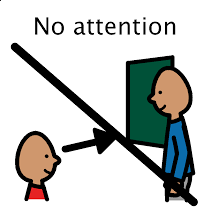 “Vita contemplativa”, in which he analyzes the religious crisis and its consequences for culture, being and current society.
“Vita contemplativa”, in which he analyzes the religious crisis and its consequences for culture, being and current society.
It begins by stating: “the current crisis of religion cannot be reduced simply to the fact that we have lost faith in God or become suspicious of certain dogmas” (page 153), it resides in the fact that we have lost the capacity to contemplate, a growing coercion Both communication and production make “contemplative time” difficult, there is no way to “stop”.
He quotes Malebrance who said that attention is like a “natural prayer of the soul”, our hyperactivity can be blamed on religion, “the crisis of religion is a crisis of attention” (page 154), and the worst thing is that the author does not points out, fanaticism dominates “attention”.
The author says “listening is the verb for religion” (page 155), but it is also for meditation, study, contemplation and reflection, whatever the threshold principle of a thought, it requires a stop, an inactivity.
In the current thought of romanticism, “freedom is decoupled from the self”, action gives way to listening: “only the tendency to intuition, when directed towards infinity, puts unlimited freedom in mind” (page 159) says the author now quoting Schleiermacher.
Still quoting Schleiermacher, he writes that tears interrupt the “spell that the subject places on nature” (page 160), dissolved in tears, the subject surrenders to the Earth.
Now quoting Agamben in “The Coming Community” he states about the coming kingdom of the Messiah that Walter Benjamin would have told Ernest Block and is quoting in Han:
“a rabbi, a true Kabbalist, once said: to establish the kingdom of peace, it is not necessary to destroy everything and start a completely new world; it would be enough to move that cup or that bush or that stone a little bit, and all things in the same way. But this little bit is so difficult to achieve and its measure so difficult to find that, as far as the world is concerned, men cannot achieve it and the messiah must arrive” (Aganbem apud Han, 2023, pg. 171).
It is this arrival, called parousia (a new coming for Christians) that is also celebrated at Christmas.
HAN, B.C. (2023). Vita Contemplativa: In Praise of Inactivity, transl. Daniel Steuer, USA, ed. Polity.

